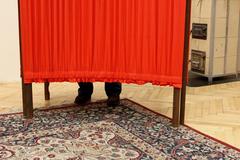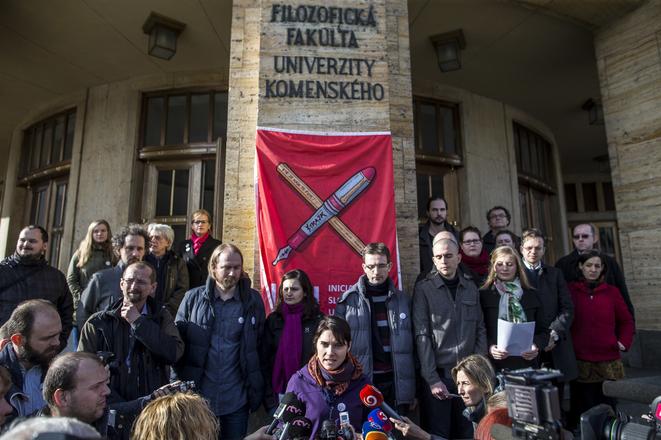Though Smer is maintaining its leading position in the polls, harvesting much greater support than its political rivals, its support has fallen from around 40 percent last autumn to current 30-35 percent, reducing its chances to rule alone.
One of the reasons, according to analysts, is change in the campaign topics. While about a month ago it seemed there will be no greater debate before the elections and Smer will determine the topics, things have now changed, says Oľga Gyárfášová of the Institute for Public Affairs (IVO).
“The pre-election campaign now focuses more on domestic topics, especially health care and education, which was determined by resignation of nurses and strike of teachers,” Martin Slosiarik, head of the Focus polling agency, told The Slovak Spectator.
Moreover, the politicians started to reveal various corruption scandals, which caused that the refugee topic predominantly used by Smer to recede.

Smer keeps falling
While the polls carried out at the turn of September and October 2015 showed Smer’s popularity oscillating around 40 percent, in the recent Focus poll conducted between January 31 and February 7 the ruling party harvested only 34.1 percent, down by 2.2 percentage points from January.
Also the MVK poll carried out between January 22 and 28 showed the dropping support of Smer. It was supported only by 32.1 percent of respondents, which is by 2.4 percentage points less than in January survey.
This may come as a result of the gradually weakening importance of the party’s main campaign topic: refugees and strengthening of Slovakia’s security which simply is not working, analysts agree.
“Several groups in society warned that the four-year rule was not as successful as Smer tries to present,” Gyárfášová told The Slovak Spectator.
People care more about everyday problems which were not addressed by the ruling party. Not even by the packages of social measures, on which Smer based its campaign, improved the public’s opinion, added Pavel Haulík, head of the MVK polling agency.
Fico may also lose votes due to the recent strikes of teachers and nurses, as well as the scandal with the steep increase in profits of a chain of clinics owned by Pavol Kostka during the past four years, Slosiarik says.
As a result, it is now less probable that Smer will continue ruling alone after the March 5 elections, according to analysts. It, however, still cannot be ruled out as there is still a group of undecided voters who may change the final results as they did in previous elections, Haulík reminded.

Sieť and SNS successful
Unlike Smer, the support for Slovak National Party (SNS) keeps increasing. In the Focus poll, it received 8.1 percent (up by 0.8 percentage points compared with January), while in MVK it harvested 10.1 percent (the same as in January).
The party may have attracted some voters who in the previous elections supported the ruling Smer, according to Slosiarik.
Meanwhile, Sieť is gradually stabilising its position as the second strongest party. In the Focus poll it won the support of 13.7 percent of respondents (up by 0.7 percentage points compared with January) and the MVK showed it would receive 14.6 percent of the vote (down by 0.1 percentage points).
If these parties confirm their positions also in the March 5 elections, they may be some kind of “associated winners” of the vote, Haulík says.
According to Gyárfášová, it will be interesting to see how big the difference between the first two parties will be.
As for other parties, the preferences of Most-Híd increased compared with previous months, especially thanks to new topics in the campaign, Slosiarik told the Sme daily. The party would harvest 7 8 percent in Focus poll and 6 percent in MVK poll.
Haulík noted that most opposition parties have begun to stagnate. It will be interesting to see how the preferences of Ordinary People and Independent Personalities (OĽaNO) will be impacted after Prime Minister Robert Fico accused leader Igor Matovič of tax fraud concerning the 2008 sale of his regionPRESS company, he added.
Though the opposition parties realised the importance of topics like education and health care, there is a question whether voters will like the alternatives they offer, Gyárfášová opines.
“I do not think they are strong enough to persuade Smer voters’ decision in favour of opposition parties,” she said.

Small parties may surprise
Another party reporting a significant increase in preferences is Sme Rodina (We Are Family) led by businessman Boris Kollár, which harvested 4.1 percent, up from slightly more than 3 percent in previous polls. One of the reasons for his success may be that he is relatively well known among the Slovak public, Sme wrote. Another reason may be that it offers different topics than the traditional parties, according to Gyárfášová.
Despite good result, it is still not clear whether the party will make it to the parliament.
“These are protest votes,” Slosiarik told Sme. “These voters are not firmly decided they will vote for him on March 5.”
The analysts agree there is a big group of voters who will make a last-minute decision. This may impact especially smaller parties which oscillate around 5 percent or less.
“If the votes from undecided voters concentrate around one party or small group of parties, it may significantly impact the election results,” Haulík opines.
The ruling party will probably not benefit from these voters as it did in previous elections. The Smer voters who are disappointed by its performance during the past four years will opt not to vote rather than support another party, Gyárfášová says.
On the other hand, the recently launched civil society campaigns may persuade some young and first-time voters to support some of the already established parties, like Sieť, Most-Híd, OĽaNO or SaS, she continued. Though the number will not be significant, it may have an impact.
“It is necessary to realise that small differences are decisive,” Gyárfášová concluded.



 Protests by teachers and nurses have hurt support for Smer. (source: SME)
Protests by teachers and nurses have hurt support for Smer. (source: SME)